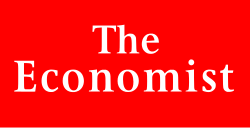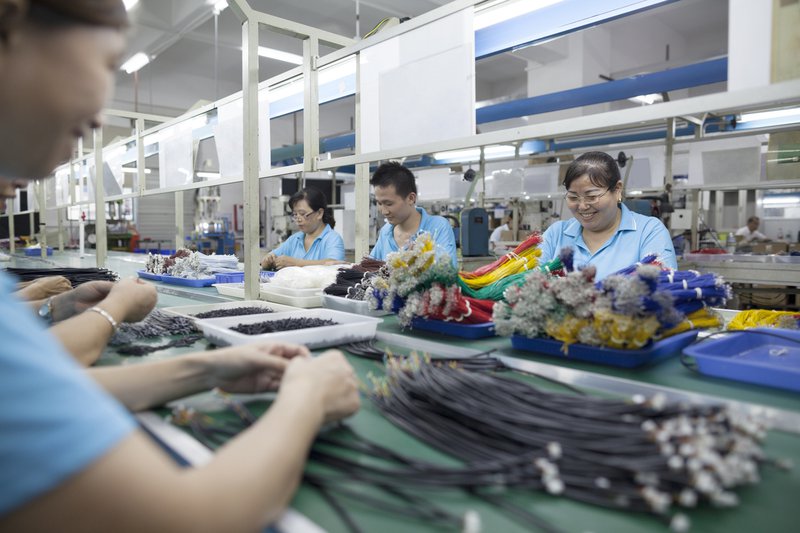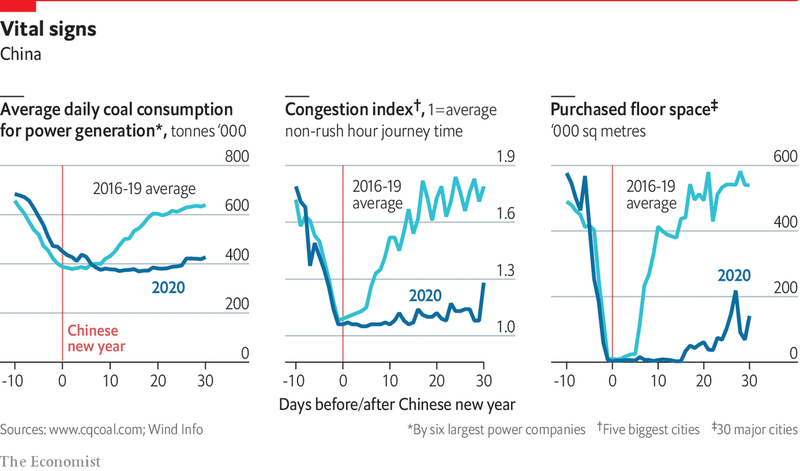
Feb. 26, 2020
IF CHINA IS the world’s factory, Yiwu International Trade City is the factory’s showroom. It is the world’s biggest wholesale market, spacious enough to fit 770 football pitches, with stalls selling everything from leather purses to motorcycle mufflers. On February 24th, as is customary for its reopening after the lunar new year, performers held long fabric dragons aloft on poles and danced to the beat of drums, hoping to bring good fortune to the 200,000 merchants and buyers who normally throng the market each day. But these are not normal times. The reopening was delayed by two weeks because of the covid-19 virus, the crowd was sparse and the dragon dancers, like everyone else, donned white face-masks for protection. The ceremony complete, business began. All those entering the market had to pass health checks and were told to be silent during meal breaks, lest they spread germs by talking.

The muted restart of the Yiwu market resembles that of the broader Chinese economy. The government has decided that the epidemic is under control to the point that much of the country can go back to work. That is far from simple. More than 100m migrant workers, the people who make the economy tick, are still in their hometowns, and officials are trying hard to transport them to the factories and shops that need them. Yiwu has chartered dozens of trains and buses to bring in workers from around the country. It also wants to lure in buyers from around the world: it has offered to cover the full cost of their flights and accommodation if they arrive before February 29th.
The market is, little by little, getting busier. But merchants lucky enough to find new customers have an even bigger challenge in fulfilling their orders. Wang Meixiao is a plastic-jewellery wholesaler, the walls of her store groaning with bead necklaces of every size and colour. But her company’s factories in Yiwu and in Haikou, 1,750km to the south-west, do not yet have enough workers to operate. Many are reluctant to leave their hometowns, fearful of the virus and unwilling to trek across the country only to have to endure 14-day quarantines at their destinations. “I tell my customers they just have to wait another couple of weeks, but that’s a guess. No one knows,” she says.
Since the outbreak of the coronavirus, economists and investors have tried to grasp the basics of epidemiology, analysing such matters as the potential incubation period of the disease and the dangers of asymptomatic transmission. Recently, they have turned their attention back to more familiar terrain, tracking the state of the economy. To gauge whether production is resuming, they examine an array of daily figures, including coal consumption, traffic congestion and property sales. All have started to rise (see chart). But all remain far below the levels indicative of a healthy economy.

One gauge has been far more upbeat—unrealistically so. China’s stockmarket fell by more than 10% after the coronavirus spread in late January but has since made up all of that ground. It even held on to its gains in recent days when global markets fell sharply because of concerns about the rise in coronavirus infections in Iran, Italy and South Korea. The bullishness in China partly stems from the belief that the government could soon unleash a big stimulus to boost growth. So far, however, it has only offered targeted support: state-owned banks are extending loans, the finance ministry is cutting taxes on a temporary basis and landlords, guided by the government, are trimming rents.
Yet China has unquestionably shifted its focus, as underlined on February 23rd when President Xi Jinping spoke via teleconference to cadres around the country, as many as 170,000 watching him. In areas where the virus is no longer a big danger, it is time for companies to resume operations, he said, adding that China still wants to meet its economic targets this year. His words, taken literally, suggest that the government wants growth of at least 5.5% in 2020, a rate that would be hard to achieve if large-scale production outages dragged on into March.
So along with reporting the number of new infections every day, officials are now reporting on the number of reopened businesses in their territories. The province of Zhejiang, a manufacturing powerhouse and home to Yiwu, leads the country so far, with 90% of its large industrial enterprises having restarted. But many of these are running at low capacities. Jason Wang is a manager with a clothing company that sells winter coats at Yiwu International Trade City. His factory started up again but only half of his employees have returned. “The government, enterprises, workers—everyone is making a gamble in restarting. But we have no choice, we have to make a living,” he says.
Like factory managers around the country, Mr Wang is taking precautions. Workers have their temperatures monitored throughout the day. They are required to keep empty seats between them in the canteen. Inside the factory, they must always wear masks (the one industry running at full tilt in China is the production of masks, which are required now of anyone taking a bus or going to work). But the pressure is intense. The government has told companies that if any of their workers become infected, they may be forced to shut.
All going well, the base case of many analysts is that China’s businesses will be back to full capacity, more or less, by the end of March. Economists at big banks think this resumption could allow first-quarter growth to reach about 4%, year-on-year. That would be the weakest since quarterly records began in 1992, but anything above zero will inevitably raise questions about whether the statistics bureau has toyed with the numbers. The balance of risks is also changing as the virus hits other countries. Just as China tries to get its businesses on track, it now faces the prospect of much weaker global demand and the danger that the epidemic, controlled within its borders, re-enters from abroad.
Even if other countries succeed in limiting the spread of the epidemic, Yiwu is testimony to some of the ways in which people far and wide will feel its economic effects. Agnes Taiwo, a businesswoman from Lagos, arrived in China just as it started to implement its strict controls to stop the outbreak. She had hoped to book a large shipment of children’s shoes and get back to Nigeria by early February. But nearly one month on, snarled by all the closures and delays, she has not yet been able to complete her order. And her return to Nigeria has been complicated because EgyptAir, the airline she took on the way over, has cancelled all flights to China. “This is serious,” she says. It is a sentiment that many others around the world are starting to share.


